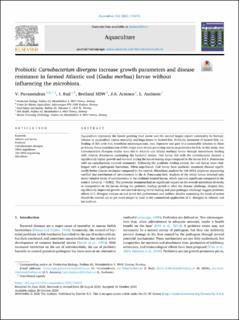| dc.contributor.author | Puvanendran, Velmurugu | |
| dc.contributor.author | Rud, Ida | |
| dc.contributor.author | Breiland, Mette Serine Wesmajervi | |
| dc.contributor.author | Arnesen, Jan-Arne | |
| dc.contributor.author | Axelsson, Lars Torsten | |
| dc.date.accessioned | 2021-02-15T12:41:38Z | |
| dc.date.available | 2021-02-15T12:41:38Z | |
| dc.date.created | 2020-11-11T10:37:52Z | |
| dc.date.issued | 2021 | |
| dc.identifier.citation | Aquaculture. 2021, 532 1-9. | |
| dc.identifier.issn | 0044-8486 | |
| dc.identifier.uri | https://hdl.handle.net/11250/2728102 | |
| dc.description.abstract | Aquaculture represents the fastest growing food sector and the second largest export commodity in Norway. Disease in aquaculture causes mortality and huge losses in farmed fish. Probiotic treatment of farmed fish, i.e. feeding of fish with live, beneficial microorganisms, may represent one part of a sustainable solution to these problems. Some carnobacteria of fish origin have shown promising results as probiotics for fish. In this study, two Carnobacterium divergens strains were fed to Atlantic cod (Gadus morhua) larvae through intermittent feeding with Artemia franciscana containing the bacterial strains. Cod larvae fed with the carnobacteria showed a significantly higher growth and survival during the larval rearing stage compared to the larvae fed A. franciscana with no carnobacteria (control treatment). Following the probiotic feeding period, the cod larvae were challenged with a pathogenic bacterium, Vibrio anguillarum. Cod larvae from probiotic treatment showed significantly better disease resistance compared to the control. Microbiota analysis by 16S rRNA amplicon sequencing verified that enrichment of carnobacteria in the A. franciscana feed. Analysis of the whole larvae detected only minor relative levels of carnobacteria in the probiotic treated larvae, which was non-significant compared to the control larvae (p = 0.062). The probiotic treatment had no significant impact on the overall microbiota diversity or composition in the larvae during the probiotic feeding period or after the disease challenge. Despite this, significantly improved growth and survival during larval rearing and post-pathogen challenge suggest probiotic effects of C. divergens mixture on cod larval fish performance and welfare. Studies examining the mode of action should be carried out to get more insight to lead to the commercial application of C. divergens in Atlantic cod larviculture. | |
| dc.language.iso | eng | |
| dc.title | Probiotic Carnobacterium divergens increase growth parameters and disease resistance in farmed Atlantic cod (Gadus morhua) larvae without influencing the microbiota | |
| dc.type | Peer reviewed | |
| dc.type | Journal article | |
| dc.description.version | publishedVersion | |
| dc.source.pagenumber | 1-9 | |
| dc.source.volume | 532 | |
| dc.source.journal | Aquaculture | |
| dc.identifier.doi | https://doi.org/10.1016/j.aquaculture.2020.736072 | |
| dc.identifier.cristin | 1846839 | |
| dc.relation.project | Norges forskningsråd: 227356 | |
| cristin.ispublished | true | |
| cristin.fulltext | original | |
| cristin.qualitycode | 1 | |
